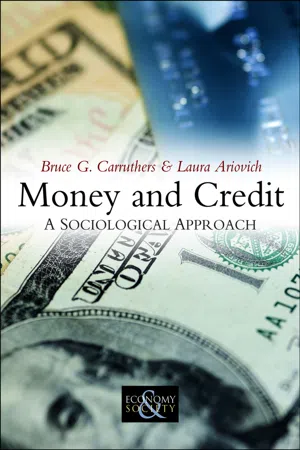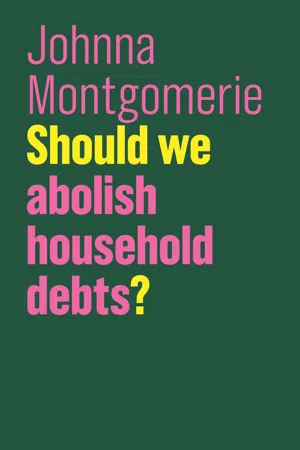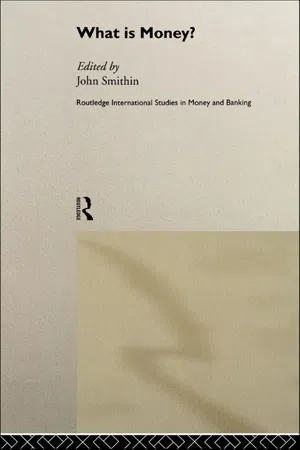Credit
Credit refers to the ability to borrow money or access goods or services with the promise of future payment. In economics, credit plays a crucial role in facilitating consumption and investment, as it allows individuals and businesses to make purchases or investments beyond their current financial means. It also contributes to the overall liquidity and functioning of the economy.
8 Key excerpts on "Credit"
- eBook - ePub
- John Roscoe Turner(Author)
- 2019(Publication Date)
- Routledge(Publisher)
...So their cash reserves are reduced to a minimum; they resort to Credit and trust to luck that they will get more money somehow when it is needed. Provident persons starting into business or desiring to enlarge operations will have little money in reserve. The need of funds to construct large productive establishments may require more money than is in circulation. This necessity, whether for purposes of consumption or of production, will lead to the establishment of a Credit system which shall serve the place of money. 3. Credit Defined. What has been said indidates that Credit is a readily acceptable thing, which performs the essential function of money, but it has a broader application. If we speak of the public Credit of Mexico, we have in mind the ability and readiness of that government to fulfil its pecuniary obligations. Credit is trust given or received; expectation of future payment for property transferred or promises given; it applies to individuals, corporations, and nations. Credit is used at times to signify a person's ability to contract a debt. "A good pay is master of another man's purse." "A good way to make debts is to pay them." William Roscher, a German economist, said: "Credit is the power of disposition over the goods of another, voluntarily granted in consideration of the mere promise of the counter-value." A more accurate statement is that Credit refers to the obligation which exists between a debtor and a Creditor during the interval of time between the two parts of a complete act of exchange...
- eBook - ePub
Money and Credit
A Sociological Approach
- Bruce G. Carruthers, Laura Ariovich(Authors)
- 2013(Publication Date)
- Polity(Publisher)
...To help reduce uncertainty, lenders now make use of great volumes of information about borrowers (their payment histories, earnings, concurrent debts, spending habits, etc.), frequently summarized in a single number, a Credit score. Credit is now much more open-ended and flexible than in the past, and can be used for (almost) whatever purpose the borrower intends. As Adam Smith would have predicted, this massive extension of Credit has mostly not occurred for altruistic reasons. 5 Rather, lenders are selfishly seeking profits, either through the interest (or fees) they charge on a loan, or through the goods they sell on Credit. Indeed, the overall well-being of the U.S. economy depends very much on whether consumers are buying goods, homes, or new cars with sufficient vigor. Today, American consumers are feeling pessimistic and are scaling back their purchases. Credit is tight and the economy is slowing down. But as has often been the case in the past, the U.S. government is not just letting this situation unfold. Rather, it is intervening in financial markets to get the Credit flowing again, bailing out banks and providing fresh injections of capital. The goal is to get the banks lending again so that economic activity will pick up. Consumer Credit is recognized by government as one of the linchpins of the modern capitalist economy, and government will prop it up if necessary. But intervention isn’t just crisis-driven, for governments have supported Credit markets both in good times and in bad. The hand of government brings with it politics. And political clout is certainly evident in the heavy support for farm Credit, or in the way that the home mortgage system benefits the middle class, sustains the construction industry, and favors suburban growth over urban renewal. Political influence is even apparent when Credit fails and insolvent debtors file for bankruptcy...
- eBook - ePub
- Johnna Montgomerie(Author)
- 2019(Publication Date)
- Polity(Publisher)
...If Credit is to be an economic utility, the moral economy of debt must recognize that Credit is made at the stroke of a keyboard. If Credit is that easy to create, then it can be eliminated equally easily. Banks have a licence to print digital money, which becomes revenue streams in the economy through consumption; but Credit contracts, too, are commodities traded many times over on global markets. If too much debt is causing wider economic problems and creating harm in society, then cancelling the existing debts is the only way to end it. The Credit irrigation system needs to be redesigned in order to ensure that the ‘unconventional’ measures taken by the central bank reach households and small businesses; and, by doing so, it would also ensure that publicly subsidized Credit is playing a useful role in the economy and betters society....
- eBook - ePub
- Gerard Roland(Author)
- 2016(Publication Date)
- Routledge(Publisher)
...Farmers need to buy seeds, fertilizers, equipment, and other supplies up to a year before they receive revenues from their crops. More affluent farmers may not need Credit if they can use their savings to purchase agricultural inputs in advance, but poor farmers rarely have enough savings. In nonagricultural sectors, most enterprises incur both fixed and variable costs from the first day of operations until revenues are received at some future date. Entrepreneurs need Credit for fixed capital expenditures such as manufacturing equipment, trucks, and computers, and they also need Credit for working capital to cover rental payments, utility bills, wages, and the purchase of various supplies and materials. Demand for Credit is related not only to production expenses, but also to various household expenditures. Credit is needed for children’s educational expenses and for various consumer items. In many countries, households spend a large amount of money, often a multiple of their annual income, for weddings and even, at times, for funerals. With economic development, the demand for consumer Credit increases as households purchase electronics such as radios, televisions, cell phones, and home computers. Demand for Credit may also be related to the various unexpected economic shocks that households can experience. These are income disruptions such as a job loss, the death of the household’s wage earner, or a fall in crop prices. There can also be expense shocks in the form of a sudden health problem or paying for damages that are the result of a natural disaster such as a flood, hurricane, or earthquake. Households generally cannot buy insurance coverage for protection against these risks, so they must borrow the money necessary to weather these adverse events. The Theory of Credit Markets in Development In order to understand problems with Credit markets, we need to focus on the transaction costs associated with Credit...
- eBook - ePub
- Joseph A. Schumpeter(Author)
- 2021(Publication Date)
- Routledge(Publisher)
...3 Credit and Capital The Nature and Function of Credit 1 The fundamental notion that the essence of economic development consists in a different employment of existing services of labor and land leads us to the statement that the carrying out of new combinations takes place through the withdrawal of services of labor and land from their previous employments. For every form of economy in which the leader has no direct power of disposal over these services, this again leads us to two heresies: first to the heresy that money, and then to the second heresy that also other means of payment, perform an essential function, hence that processes in terms of means of payment are not merely reflexes of processes in terms of goods. In every possible strain, with rare unanimity, even with impatience and moral and intellectual indignation, a very long line of theorists have assured us of the opposite. Economics, almost since it became a science, has continually resisted the popular errors which cling to the phenomenon of money — quite rightly. This has been one of its fundamental services. And whoever thinks through what has been said so far will easily be convinced that none of these errors is maintained in it. Of course if one were to say that money is only a medium for facilitating the circulation of goods and that no important phenomena can be connected with it, this would be false. If one would forge out of this an objection against our argument, then it would be at once refuted by our proof that in our case a different employment of the system’s productive powers cannot be achieved otherwise than by a disturbance in the relative purchasing power of individuals. We saw that, in principle, a loan of the services of labor and land by workers and landlords is not possible. Nor can the entrepreneur himself borrow produced means of production. For in the circular flow there would be no idle stocks for the needs of the entrepreneur...
- eBook - ePub
- Joseph A Schumpeter(Author)
- 2017(Publication Date)
- Routledge(Publisher)
...Obviously the whole circulation of an economy without development may also consist of Credit means of payment. Since these means of payment, however, would function just like metal money in that they are “certificates” for existing goods and past services, and since there is therefore no essential difference between them and metallic money, by using this expository device we merely indicate that what we regard as the essential element in the Credit phenomenon is not to be found in current Credit within the circular flow. By this we have both proved our thesis and precisely formulated the sense in which it is meant. Only the entrepreneur then, in principle, needs Credit; only for industrial development does it play a fundamental part, that is a part the consideration of which is essential to an understanding of the whole process. Furthermore, it is seen at once from the arguments of the second chapter that the correlative of the thesis also holds good, namely the statement that where there is no direct power of disposal by leaders over means of production, development is in principle impossible without Credit. The essential function of Credit in our sense consists in enabling the entrepreneur to withdraw the producers’ goods which he needs from their previous employments, by exercising a demand for them, and thereby to force the economic system into new channels. Our second thesis now runs: in so far as Credit cannot be given out of the results of past enterprise or in general out of reservoirs of purchasing power created by past development, it can only consist of Credit means of payment created ad hoc which can be backed neither by money in the strict sense nor by products already in existence. It can indeed be covered by other assets than products, that is by any kind of property which the entrepreneur may happen to own...
- eBook - ePub
Inequality, Boom, and Bust
From Billionaire Capitalism to Equality and Full Employment
- Howard J. Sherman, Paul D. Sherman(Authors)
- 2018(Publication Date)
- Routledge(Publisher)
...Therefore, stock prices move up and down fairly rapidly in the expansions and contractions. They rise and fall somewhat more than interest rates, a factor that affects the way money gets invested in the stock market or in bonds. p.95 Effect of Credit on inequality If everyone had high incomes that were roughly equal, then no one would require or desire a large amount of Credit. If everyone had low incomes, then there would be plenty of reason for borrowing merely to remain at a reasonable level of subsistence, but there might also be more borrowing for the reason of “staying ahead of one’s neighbors.” In the reality of extreme inequality in America, people go into debt both because they are forced to do so by economic circumstances and because they wish to outdo their neighbors in the consumption of goods and services. Once one is heavily in debt, it is difficult to get out of that situation. Repayment of the debt as well as interest payments is a considerable burden on the borrower. The current debt makes it that much harder to gain a subsistence level for oneself and one’s family without going further into debt. The existence of large-scale debt for a considerable chunk of the population under conditions of inequality means that the economic situation becomes more and more fragile. If there is a recession, then consumers cannot pay back their loans. Corporations also cannot pay back their loans. Householders cannot afford to pay their monthly mortgage payments. The effect of these defaults greatly exaggerates the economic contractions. More specifically, if people start to lose their jobs, then they are unable to pay back their debts. If they are not able to pay back their debts, then those industrial or financial corporations that own their debts may themselves be weakened and faced with possible bankruptcy. The same arguments are equally true of corporations...
- eBook - ePub
- John Smithin, John Smithin(Authors)
- 2002(Publication Date)
- Routledge(Publisher)
....9). These Credit/debt relations emerging in semi- nomadic societies, such as those of the Indians of the sub-Arctic region of Canada (where land remained collective property, even after European contact), would suggest that private property rights are not a necessary prerequisite to the appearance of such relations in primitive economies. We agree with Heinsohn and Steiger (1984), however, that private Credit/ debt relations predate more advanced monetary systems based on state coins or private bank liabilities as circulating medium. Indeed, in more modern monetary capitalist economies with entrenched private property rights, money appears when there exists a set of agents, which we shall call ‘banks’ (including the central bank), whose debts are accepted by all other agents in an economy as a means of payment to settle their own debt commitments. Banks are deemed to be so Creditworthy that no holder of their debts would ever ask for reimbursement either in kind or in the debt of another agent. Banking institutions enjoy, therefore, the capacity of freely issuing debt without it being subject to an exogenous resource constraint. This means that banks can create these debts ex nihilo when they grant Credit to non-bank agents who must spend them to acquire real resources. Bank Credit entails the advancing of loans of newly- created bank debt to economic agents who cannot depend on some preexisting stock of bank liability, which itself would be the result of previously-incurred outstanding bank Credit in the economy. Once Credit has been advanced, however, non-bank agents become committed to paying back their loans at some future date by collecting the required quantity of bank debt out of their cash receipts, either from the sale of newly-produced commodities, or from the sale of titles to existing wealth...







